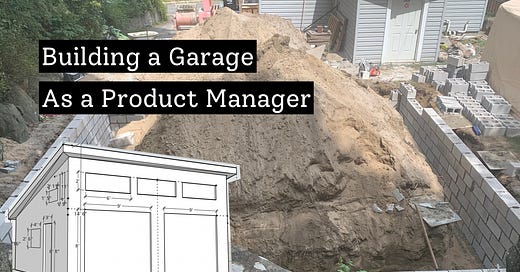Building a Garage as a Product Manager
Managing construction projects can’t be that hard, right?
A couple of years ago, I got the idea that we could build a garage in our backyard. The idea started as a simple single-car garage but slowly evolved. Eventually, we had plans for a two-car garage, with a two-bedroom apartment above it that my parents could move into now that they’re retired. We hired a builder and put down our deposit last year in hopes of building in the spring of 2024.
Fast-forward to late last year. Our builder disappeared, taking our money with him (we’ve heard from other clients since he owes hundreds of thousands to customers, staff, and suppliers). Then, I got laid off from my job, and at this point, there was no way we could afford to continue this project as planned.
Over the winter, I couldn’t even think about the project without feeling sick. I landed a new job in March, and we pivoted our plans. Our new approach was a much simpler two-car garage. There was no living space, but at least it would help satisfy our storage needs. But how do we get this built? I didn’t want to go through the agony of hiring a builder and being swindled again.
I guess I’ll just manage it myself!
As a product manager in tech, I assumed managing construction work would be easy. That hasn’t been the case, and I now have a newfound appreciation for construction managers. There have been a lot of challenges along the way, and this is one project I can’t wait to wrap up.
Here are some things I’ve learned along the way that are also very applicable to your work as a product manager:
It helps to be knowledgeable in the industry
Every architectural drawing has had issues (and there have been many revisions). Every sub-contractor has missed some detail that I’ve had to correct. This has meant paying close attention and checking in on the job site multiple times per day. A lot will be missed if you don’t know what to look for. I’ve had to do a lot of research about construction techniques and terminology along the way.
Check-in while the work is getting done
I hired a masonry company to do the foundation. While they prepped to pour the floor, I noticed a key detail was missed. One side of the floor was to be thicker than the other to support a 4-post car lift. This critical detail was missed in one of the drawings, which happened to be the one they were referencing. That’s an expensive mistake to fix after the fact.
Dependencies
While reviewing an order for roof trusses (which typically need to be ordered months in advance), I realized they had the wrong end trusses. Thankfully, I caught it before it was too late. Otherwise, we would have had a half-finished roof sitting open for months.
Timing is crucial
Having all the materials when you need them is a challenge. Construction projects get dragged out when waiting for materials. I need to work with suppliers to know their delivery timelines, and be sure to order supplies in advance of when we need them.
Planning is everything.
Good planning results in fewer delays and prevents costly mistakes. You don’t have to get everything right, but the ‘foundation’ (pun intended) of what you’re building should be solid.
Changes during the planning phase are cheap; re-doing work is expensive
I’ve changed my mind about many aspects of this project several times, and I’ve spent more money than I’d like getting revisions from the architect. However, once built, making changes is even more expensive.
Stay focused on the goal
We might not be able to get everything exactly how we want it, but that’s okay. It doesn’t have to be a pixel-perfect copy of the rendering. It’s common to find the exact siding, or windows you want are on back order. I’m having a really difficult time finding the garage doors I want. But that’s ok.
We’re not finished the garage yet. I’ve booked next week off work to do all the framing, siding and roofing. Most of our supplies will be delivered this week, and I have three experienced framers coming to help.
I often find similarities between product management and roles in other industries. They’re not always this “concrete”, but it can be helpful to get out of our bubble sometimes and consider how other people handle similar situations we find ourselves in.





